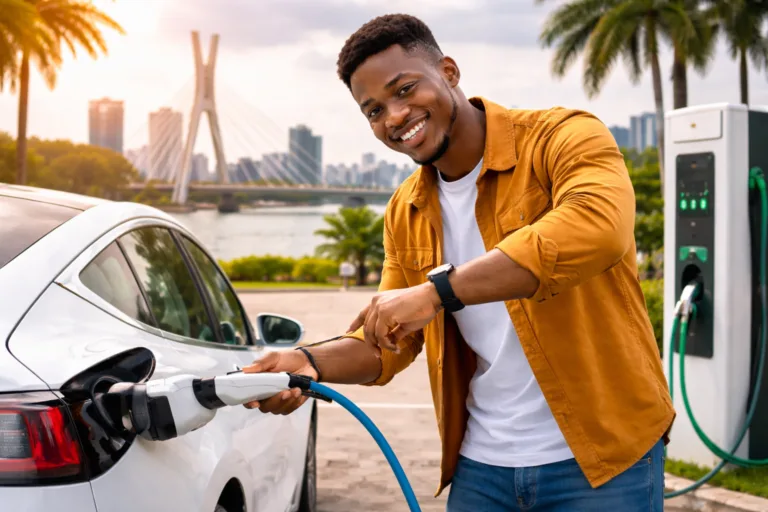While electric bikes have received a positive reception in most countries, they have encountered resistance in some other countries. Because of the epileptic power supply in Nigeria, you might think Nigeria will be amongst the countries that posed resistance to the technology. Well, you are in for a surprise.
Nigerians are more concerned about comfort and luxury than anything else, especially the middle class and upper-class Nigerians. Electric bikes provide both and even more.
Electric bikes are a relatively new technology, and the industry has exploded in recent years. Every other day, new models of bikes are launched and imported into Nigeria, giving people more options.
Most Nigerians are unaware that electric bikes are being used in Nigeria, especially in major cities like Lagos, Abuja, and Port Harcourt. If you are one of those people, this article is for you.
This article explores everything you need to know about electric bikes. Its definition, how it works, the price range of electric bikes, and its feasibility in Nigeria.
What are electric bikes?
Electric bikes are also called e-bike. Electric bikes are bicycles that require an electric motor for pedaling. When most people think of e-bikes, they think of bikes that drive themselves with little or no assistance from the driver. Well, it’s the reverse. The motor in electric bikes provides the aid while you do the pedaling.
Electric bikes are a fun means of transportation as most models allow you to optimize your rides by providing various riding modes to choose from. With these modes, you are given the power to regulate the amount of energy supplied through the pedals with range and battery life.

The working mechanism of electric bikes
Electric bikes are powered by batteries that require charging now and then. The battery is located in the electric bike’s center, front or rear. The batteries located in the center are called mid-drive motors powered through the cranks. However, electric bikes with the motor in the front are called hub-based motors and push the wheel clockwise and anticlockwise, whereas an electric bike with its motor in the rear works through its chains and gears and is also called axle-mounted.
When you are pedaling your electric bike, the torque sensor measures the amount of pressure being mounted and equalizes it with the motor’s power output. The motor will not take over entirely and will need to be charged from a consistent and direct power delivery to prevent the electric bike from moving backwards when you pedal.
As mentioned earlier, the source of power for electric bikes is batteries, and they are usually located on the bike’s exterior. For some bikes to be charged, the batteries would need to be removed first, while others can still be charged with their batteries in them. It depends on the model you buy or have, and that is why it is essential to read the user’s guide that accompanies your bike.
Electric bikes are also accompanied by controllers usually incorporated into the frame or mounted on the handlebar. The controller lets you control the speed and other assistance you want as you drive and monitor the battery level. With various upgrades to electric bikes, some models come with an android touch screen and other special features. Operating your electric bike will be easy as ABC if you can dutifully read your user’s manual.
Is the use of e-bikes in Nigeria feasible?
The question, “is the use of electric bikes in Nigeria feasible?” is valid, especially in Nigeria, where the power supply is poor. The poor power supply is why several Nigerians are not receptive to e-bikes in the country.
Several factors must be checked before the average Nigerian purchases an electric bike. Let’s paint a typical scenario. As a Nigerian living in Lagos, one of the most densely populated cities in the country with a high traffic rate, imagine driving an electric bike in traffic, and your battery runs low. What next? The chances that you will get the power to charge your bike are slim; hence, you become stranded. It is scenarios like this that run through the mind of Nigerians when considering the use of electric bikes.
Also, the mechanics in Nigeria lack the required expertise to repair e-bikes in cases where they get faulty or require maintenance.
The price range of electric bikes in Nigeria
Electric bicycles have different models and are made in various sizes, features, shapes, and designs. Depending on the brand of bike you want to buy, the price of electric bikes in Nigeria ranges from 200,000 naira to over a million. The price range might increase sooner than later because of the recent global issues. Hence, it is better to buy your electric bike now that the prices are still reasonable.
You will never regret buying an electric bike because they are durable, easy to drive and maintain. The best electric bike brands to purchase in Nigeria are Bosch, Shimano, Yamaha, Specialized, Mahle, FSA, and Fazua.
Features to consider before buying an electric bike in Nigeria
Before you consider purchasing an electric bike in Nigeria, there are some features you need to consider. Some of these features are listed below.
Battery: The same way you consider the battery capacity of your phones before purchase because you want them to last for long before charging is the same reason you need to check the battery capacity of the electric bike you’re buying. Essential features of the battery to look out for are the durability of the cells in the battery, and its recharge cycle, which determines the distance the bike can cover per full charge.
Comfort: This feature is vital because it determines your overall user experience. Make sure the workings of the bike are easy to navigate. Check that the seats are comfortable and durable before buying.
After reading this article, it will become effortless to purchase an electric bike in Nigeria. Do not forget to consider the factors before buying an electric bike.




